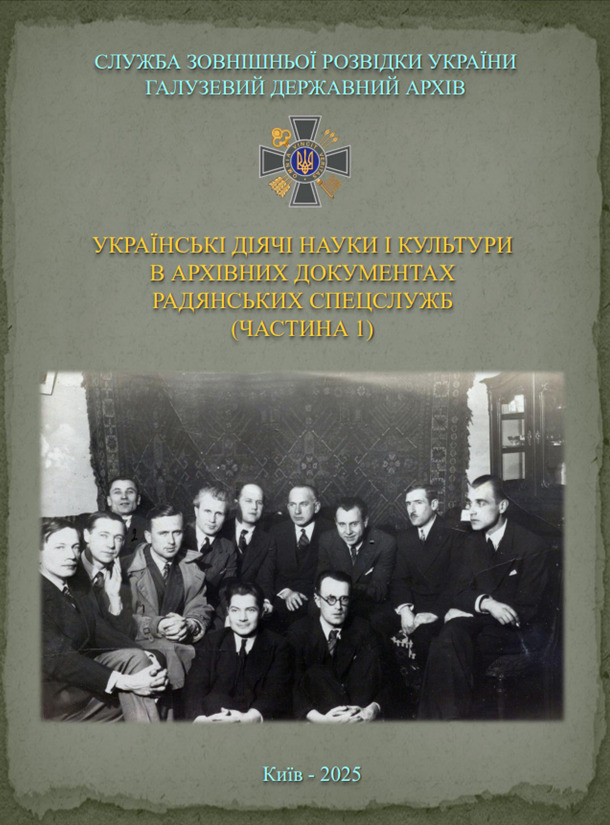UNVEILED HISTORY
“Dnipro” in West Germany. The kgb’s Special Operation
In 1956, the kgb of the ussr created a fake agent group “Dnipro” in West Germany, which supposedly held patriotic positions, cared about Ukrainian interests, and called on emigrants to return to their homeland. But behind these seemingly sincere appeals and calls there laid thoroughly thought-out and far-reaching plans to sow discord and enmity among Ukrainian emigrants, compromise their leaders in the eyes of ordinary members of nationalist organizations, turn them against each other, and sow despair. Declassified documents from the archives of the Foreign Intelligence Service of Ukraine reveal what was really hidden in the murky waters of the “Dnipro” and what techniques the kgb used to achieve this.
2/8/2026
Information Bureau of the General Staff of the Army of the Ukrainian People’s Republic. Milestones in the History of Ukrainian Intelligence
The intelligence of the Directory period largely retained the directions, forms, and methods of obtaining secret information characteristic of the special services of the Hetmanate. At the same time, the potential of some of its varieties was higher. The central body of military intelligence of the Armed Forces of the Ukrainian People’s Republic was the Rozvidochna Uprava (Intelligence Directorate – Transl.) of the General Staff. At that time, military intelligence had the following organizational structure: a central apparatus, regional bodies, relevant units of military formations (divisions, corps, brigades), field intelligence units, radio intelligence units, and others. The main intelligence unit was the Agent Department. It was responsible for providing the head of the Intelligence Department of the General Staff with comprehensive information and analytical material prepared on the basis of reports from agents, field intelligence, radio interception, and press materials. The reports contained information on the deployment and general condition of the Red Army troops, the armed formations of the “white” general Wrangel, otaman Makhno, and others. The unit was also involved in conducting operations behind enemy lines.
1/23/2026
Symon Sozontiv. The Guardian of Ukrainians in France and the kgb’s “Guardianship” over Him
The kgb’s operational case against Symon Sozontiv was code-named “Kauchuk” (“Rubber” – Transl.) This was because he owned a small rubber goods factory in France. But he was of interest to the chekists not only as a businessman and patron of the arts, but above all as the long-time head of the “Ukrainska Hromadska Opika” (“Ukrainian Community Care” – Transl.) in France and later as the head of the executive body of the Ukrainian National Council (Prime Minister of the Government in exile). They intended to use his certain character traits, political vacillations, and ambitions to carry out a special propaganda operation. According to declassified documents from the archives of the Foreign Intelligence Service of Ukraine, the operational cultivation of S. Sozontiv was intensified in the mid-1950s, while the case file on him had been kept since 1936.
1/15/2026
Poet Leonid Lyman. “How I Became an Enemy of the People”
Among a series of the kgb’s operational cultivations of representatives of the Ukrainian creative intelligentsia who found themselves in exile, the case of poet Leonid Lyman occupies a separate niche. At least in terms of the methods used to compromise him. A step-by-step disclosure of the kgb’s “kitchen” based on declassified documents from the archives of the Foreign Intelligence Service of Ukraine makes it possible to clearly show how evidence of anti-soviet activity was falsified, non-existent facts were invented, the names of well-known international organizations and the signatures of their leaders were used, and how foreign journalists were involved in spreading false information.
1/5/2026
“Spanish Children” in the ussr. Return to Their Motherland... Through Cooperation with the kgb
A number of cases involving former “Spanish children” who were taken from Spain to the ussr in 1937–1938 to escape the war have been found in the archives of the Foreign Intelligence Service of Ukraine. The files date back to the mid-1950s, when they were repatriated to their homeland. According to declassified documents, shortly before their departure, many of those young men and women, now adults, met with kgb officers, who established operational contact with them, persuaded them to cooperate, taught them the basics of illegal work abroad, worked out passwords and methods of communication, gave them tasks, and paid them money.
12/18/2025

